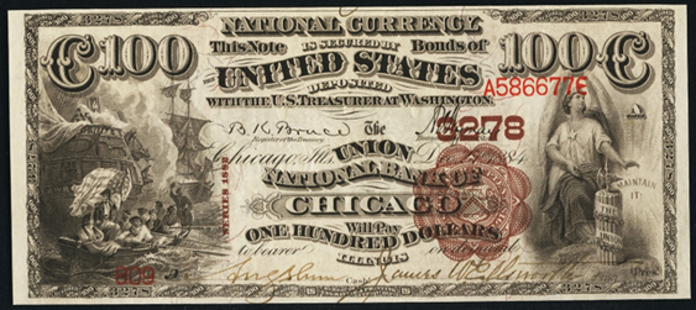One Hundred Dollar Notes › Nationals › 1882 One Hundred Dollar National Bank Notes › Kansas Charters › 1882 $100 Colby Kansas First National Bank
Get Value Now
| Item | Info |
|---|---|
| Series | 1882 |
| Charter | #3512 First National Bank of Colby, Kansas |
| Year Chartered | 1886, 184 Banks Chartered |
| City Info | Colby is a city in and the county seat of Thomas County, Kansas, United States. As of the 2010 census, the city population was 5,387. In 1882, a post office was established near the center of Thomas County. Area homesteaders lived under harsh conditions in sod houses, creating demand for a town to provide lumber and other provisions to incoming settlers. J.R. Colby, a local land assessor and preacher, obtained a patent to establish the town in April 1884, and land was acquired for the town site three miles north of the post office in March 1885. The following month, the Kansas Secretary of State issued the Town Charter. Kansas Gov. John Martin named Colby the county seat in 1885, and the city was incorporated in 1886. The Union Pacific Railroad reached the city in 1887, and the Rock Island Railroad followed the next year. Source: Wikipedia |
| Similar Cities | City name is unique, no others like it. |
| Seal Varieties | Brown, Blue |
| See Also | If your note doesn't match try: 1. 1882 $100 Gold Certificate 2. 1878 $100 Legal Tender 3. 1880 $100 Legal Tender |
| Other Info | 1. Value depends on notes known for charter, condition and market demand. 2. Rare and highly desirable National Note. |
| Neat Fact | Date Backs issued in sheets of 2 Notes: 1 $50 Note & 1 $100 Note (Friedbergs, 20th Ed. P119) |
No Obligations Offers and Appraisals
Please submit a good photo or scan. It will be identified and evaluated. Understand there may be subtle differences between the image you see above and your note. Signatures, design, markings and note condition will determine the offer price. Notes in Uncirculated or better condition receive the best offers.
Appraisals can be estimated for wholesale and retail prices. Wholesale is what dealers typically pay. Retail is what a collector might pay. Retail is slightly higher in most cases.
Please visit this page for USA Paper Money Reference. Do not treat this page as a reference guide, it is for appraisal and acquisition purposes only.
